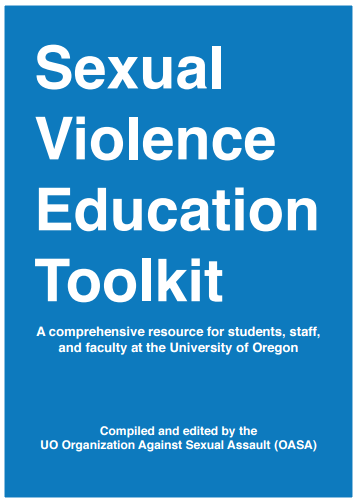|
NOTE: We have decided to remove the Toolkit from our website to continue the editing process. Please see the above blog post to learn more.
We're happy to announce that we are officially releasing the first edition of the OASA Sexual Violence Prevention Toolkit, a pamphlet with valuable information about sexual violence at the University of Oregon and beyond. You can download the Toolkit via our resources page. OASA took on this project with the goal of providing clear sexual violence-related definitions, debunking common myths, and provide a comprehensive list of campus resources from a student's perspective. We hope that you'll find this document useful for you and any organizations you work with! We have several hard copies of the Toolkit that we will be distributing to student groups. If you or an organization you work with would like a physical copy of the Toolkit, please e-mail [email protected].
1 Comment
The following statement represents the UO Organization Against Sexual Assault’s (UO OASA) stance on the UO Responsible Employee Duty to Report Sexual Harassment and Sexual Assault policy. This policy came to our organization’s attention from members of OASA and concerned campus community members; we are responding to UO Responsible Employee Duty to Report Sexual Harassment and Sexual Assault policy because of the expressed concerns. Firstly, we would like to note that we are not explicitly opposed to the moving of this policy. This policy successfully clarifies rules and regulations regarding the UO’s required reporting process, which has been ambiguous since its inception. What we do take issue with, however, is the UO’s implementation of required reporting policies in general. Required reporting discourages survivors of harassment, abuse, and violence from seeking help from on-campus resources and from their fellow students, staff, and faculty. The reasons why survivors of sexual violence would not want to disclose their experiences to university administrators and officials are expansive and valid: institutional betrayal, fear of retaliation, or disinterest in working within university resources are all possibilities. Many argue that current required reporting policies hold perpetrators accountable and increase reports of sexual violence on campus. However, while these goals are noble, we feel the University should prioritize survivor safety, wellness, and resource access above all else. We believe access to resources and support for the current individuals reporting should be prioritized over an increased number of reports. If our institution is invested in being survivor-centered, then survivors should be allowed to seek help on their own terms--including seeking individualized support and assistance from colleagues, friends, instructors, professors, mentors, and peers--without intervention from university administrators or officials. If we are truly invested in connecting survivors to resources, then required reporting is counterproductive. Required reporting also puts student and classified employees, graduate teaching fellows, and faculty in stressful situations. If a survivor discloses their experience to someone in any these positions, the required reporter risks losing the survivor’s trust, compromising their relationship with the survivor, or going against the survivor’s will by being forced to report. Should the required reporter not report in an effort to do right by the survivor, the required reporter risks severe punishment. Instead of forcing employees, GTFs, and faculty into these tumultuous situations, more effort should be directed to educating individuals how to support survivors in any capacity. It should also be noted that many of these parties can interact on an informal level (such as a student employee or GTF with non-University employed student), and this can place additional pressure on required reporters who receive disclosures in informal settings. Although we appreciate that effort has been made to clarify the required reporting rules and processes on this campus, we are still fundamentally opposed to required reporting policies. Required reporting is a policy intended to increase the number of reports received by the University. However, OASA members have told by survivors of sexual violence that required reporting has discouraged them from sharing their experiences and getting the help that they need. We hope you will consider our opposition to required reporting before this policy is passed. Sincerely, UO OASA UPDATE: At the University Senate meeting on May 11, the senators approved an amendment that will allow required reporters to opt out of their required reporting requirement after taking a course led by University administrators. At the completion of the training, participants would then be confidential reporters with no obligation to report cases of sexual violence that have been disclosed to them by students, staff, or faculty. As a student organization opposed to required reporting, we applaud this measure and are pleased that efforts are being made to allow for individuals to opt out of this role. However, we stand with our initial statement that required reporting should be abolished completely at the University of Oregon, and that this amendment is ultimately not enough. |
Archives
April 2020
Categories |


 RSS Feed
RSS Feed
